

Climate Shocks Costing U.S. $1bn a Day. Stronger hurricanes, hotter heat waves, more frequent wildfires and more severe public-health issues are all adding to the costs of climate change, which will reach almost $1 billion a day in the U.S. within a decade, according to a report released Wednesday.

Total costs to address the impact of rising temperatures will swell 50 percent by 2027, to $360 billion annually, according to the study from the Universal Ecological Fund. That equates to about 55 percent of expected economic growth in the U.S. The report comes as the U.S. continues to reel from one of the costliest hurricane seasons in history. Hurricanes Harvey, Irma and Maria have inflicted an estimated $173 billion in damage in Texas, Florida, Puerto Rico and the U.S. Virgin Islands. The study’s conclusion that fossil fuels exacerbate global warming and create a drag on economic growth runs counter to the view of the White House. The economic toll of climate change is not limited to storms. Food Prices Rise 23% Due to Climate Extremes.
New research in climate science indicates that extreme events, such as heat waves, the collapse of major ice sheets, and mass extinctions are becoming dramatically more probable.
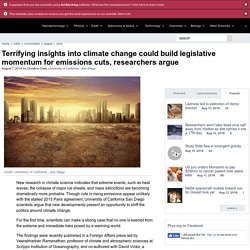
Though cuts in rising emissions appear unlikely with the stalled 2015 Paris agreement, University of California San Diego scientists argue that new developments present an opportunity to shift the politics around climate change. For the first time, scientists can make a strong case that no one is exempt from the extreme and immediate risks posed by a warming world. The findings were recently published in a Foreign Affairs piece led by Veerabhadran Ramanathan, professor of climate and atmospheric sciences at Scripps Institution of Oceanography, and co-authored with David Victor, a professor of political science at UC San Diego's School of Global Policy and Strategy (GPS) and director of the Laboratory on International Law and Regulation.
Wealthier economies feeling the heat A hot planet is bad for human health. Global Carbon Price Implemented. Insurance Unavailable for Vulnerable NZ's Coastal Properties. Tens of thousands of coastal homes might not be eligible for insurance due to the increasing risk posed on them by the effects of climate change, a new report suggests.

Wellington waterfront Photo: 123RF A 2015 report to the Parliamentary Commissioner for the Environment found New Zealand has 43,683 houses within 1.5m of high tide and 8806 within 50cm. Now, a report by Motu Economic and Public Policy Research exploring the effects of climate change on insurance suggests those homes could become no longer eligible for insurance. - Read the full report.
$2tn A Year In Lost Productivity Due To Climate Change. Global warming will cost the world more than $2 trillion a year in lost productivity by 2030 as it becomes too hot to work in many sectors, according to new research.
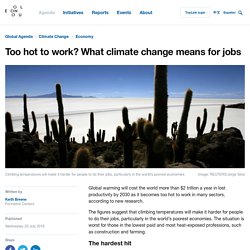
The figures suggest that climbing temperatures will make it harder for people to do their jobs, particularly in the world’s poorest economies. The situation is worst for those in the lowest paid and most heat-exposed professions, such as construction and farming. The hardest hit The report says that India and China together stand to lose $450 billion in output by 2030. The economies of richer nations, such as Japan and the UK, are unaffected by heat stress and the US saw only a modest dip of 0.2% of GDP. Image: Bloomberg The researchers, led by Tord Kjellstrom of the Health and Environment International Trust in New Zealand, projected the GDP losses due to heat stress for 43 countries using environmental data and computer models. Asia and Africa will suffer the most, according to Dr Kjellstrom. Renewable Generation Cost-Competitive with Conventional Fuels. Tackling climate change is expensive.

Fisheries Experience $10bn/ann. Loss Due to Climate Change. Assuming constant price, global MCP is projected to decrease globally by 7.7% (±4.4%, average across results from three ESMs) by 2050 (average between 2041–2060) relative to 2000 (average between 1991–2010) under the business-as-usual scenario (RCP 8.5).
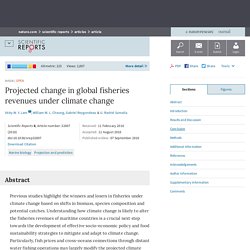
In contrast, global fisheries revenue (or landed value at Maximum Revenue Potential–MRP) is projected to decrease by 10.4% (±4.2%), i.e., about 35% more than the impact on MCP (Table 1) at a global scale. US$60bn Lost Annually To Coastal Flooding. Affiliations The World Bank, Sustainable Development Network, Washington DC 20433, USA Stephane Hallegatte Centre International de Recherche sur l’Environnement et le Développement (CIRED), Nogent-sur-Marne 94736, France Stephane Hallegatte Flood Hazard Research Centre, Middlesex University, London NW4 4BT, UK Colin Green Faculty of Engineering and the Environment, University of Southampton, Southampton SO17 1BJ, UK Robert J.
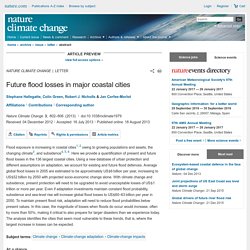
Nicholls Organisation for Economic Co-operation and Development, Paris 75775, France Jan Corfee-Morlot Contributions The four authors designed the study, interpreted results and authored the paper. S.H. developed and ran the models. Competing financial interests The authors declare no competing financial interests. Rising Seas Cost the World $14 trillion a year. Failure to meet the United Nations' 2ºC warming limits will lead to sea level rise and dire global economic consequences, new research has warned.
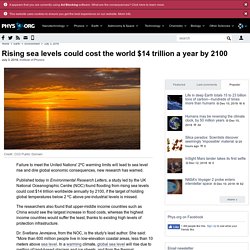
Published today in Environmental Research Letters, a study led by the UK National Oceanographic Centre (NOC) found flooding from rising sea levels could cost $14 trillion worldwide annually by 2100, if the target of holding global temperatures below 2 ºC above pre-industrial levels is missed. The researchers also found that upper-middle income countries such as China would see the largest increase in flood costs, whereas the highest income countries would suffer the least, thanks to existing high levels of protection infrastructure.
Dr. Global Financial Assets Down by $2.5tn Due To Climate Change. Europe's Coastal Foods Costing up to €1tn per year. US East & Gulf Coasts Climate Adaption Costs Top $1.1tn.